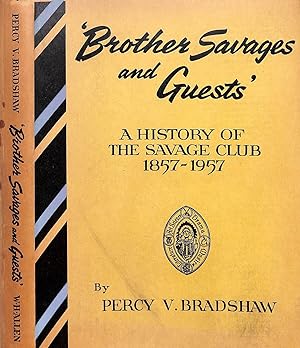Beschreibung
[162] pp. Percy V. Bradshaw W. H. Allen 1958 10.5" x 8" The Savage Club, founded in 1857, is a gentlemen's club in London, named after the poet, Richard Savage. Members are drawn from the fields of art, drama, law, literature, music or science.History The founding meeting of the Savage Club took place on 12 October 1857, at the Crown Tavern, Vinegar Yard, Drury Lane, after a letter by pro tempore honorary secretary George Augustus Sala was sent to prospective members. The letter advised it would be 'a meeting of gentlemen connected with literature and the fine arts, and warmly interested in the promotion of Christian knowledge, and the sale of exciseable liquors' with a view to 'forming a social society or club'. The inaugural gathering would also decide upon the new association's 'suitable designation'. Richard Savage, poet (c 1697 -1743) Around 20 attended the first meeting including William Brough, Robert Brough, Leicester Silk Buckingham, John Deffett Francis, Gustav von Franck, Bill Hale, Sala, Dr G. L. Strauss and William Bernhardt Tegetmeier. Andrew Halliday, joint honorary secretary in 1858, and later club president, wrote in his 1867 anthology, of how the 'suitable designation' was determined: 'When about a dozen of the original members were assembled in the place selected for their meetings, it became a question what the Club should be called. Every one in the room suggested a title. One said the Addison, another the Johnson, a third the Goldsmith, and so forth; and at last, after we had run the whole gamut of famous literary names of the modern period, a modest member in the corner suggested The Shakespeare. This was too much for the gravity of one of the company (the late Mr Robert Brough) whose keen sense of humour enabled him, in the midst of our enthusiasm, to perceive that we were bent on making ourselves ridiculous. Who are we, he said, that we should take these great names in vain? Don't let us be pretentious. If we must have a name, let it be a modest one, one that signifies as little as possible. Hereupon a member called out, in a pure spirit of wantonness, The Savage. That keen sense of humour was again tickled. The very thing! he exclaimed. No one can say that there is anything pretentious in assuming that name. If we accept Richard Savage as our godfather, it shows that there is no pride about us. And so, in a frolicsome humour, our little society was christened the Savage Club. 'Illustrated menu card Menu card for the Savage Club's 40th anniversary dinner in 1897 Many of the original members were drawn from the ranks of bohemian journalists and writers for The Illustrated London News who considered themselves unlikely to be accepted into the older, arts related Garrick Club, but, within two decades, the Savage Club itself had become 'almost respectable'. The early requirement - 'a working man in literature or art' - was soon broadened to include musicians, and the club's first piano was hired in 1871, prompting Halliday to tell another member 'Hang your piano. it's ruining the Club'. An associated Masonic lodge was established in 1887.The club has hosted a variety of guests over the years including American writer and humorist Mark Twain, and the Australian cricket team during its 1934 English tour. In 1940, Oswald Mosley, founder of the British Union of Fascists, arrived as a guest of Henry Williamson, author of Tarka the Otter, but was asked to leave. The club features in Arthur Conan Doyle's classic novel, The Lost World. The club moved from its original home at the Crown Tavern, the next year to the Nell Gwynne Tavern. In 1863 it moved to Gordon's Hotel in Covent Garden, then to 6Ð7 Adelphi Terrace, later to 9 Fitzmaurice Place, Berkeley Square, London W1, and, from 1936 to the end of 1963, Carlton House Terrace in St James's (previously the home of the Conservative statesman Lord Curzon).[11] From 1990, the club has been based in a room of the National. Bestandsnummer des Verkäufers 35121
Verkäufer kontaktieren
Diesen Artikel melden
![]()




